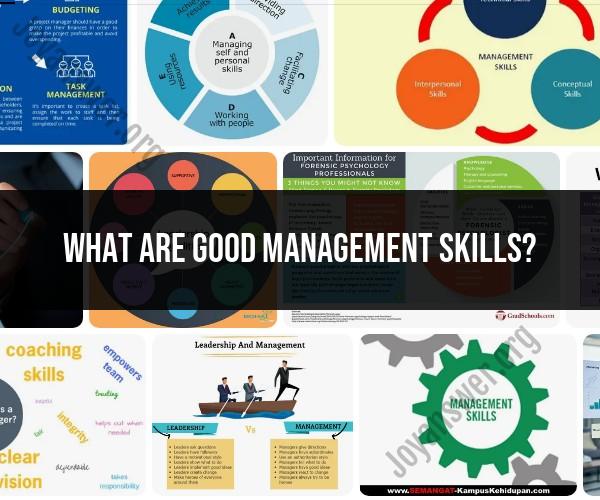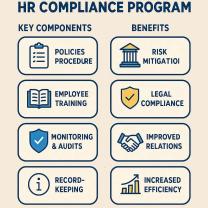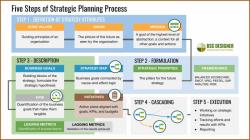What are good management skills?
Good management skills are essential for effective leadership and the success of any organization or team. These skills encompass a wide range of abilities and attributes that enable managers to plan, organize, lead, and control their teams to achieve goals and objectives. Here are key management skills for success:
1. Leadership:
- A strong leader provides vision, direction, and inspiration to their team. Effective leaders set an example, motivate, and create a positive work environment.
2. Communication:
- Effective communication is vital for conveying ideas, instructions, and feedback. Managers should be able to communicate clearly, listen actively, and adapt their communication style to their audience.
3. Problem-Solving:
- Managers need to identify challenges, analyze problems, and find practical solutions. Strong problem-solving skills help in making informed decisions and overcoming obstacles.
4. Decision-Making:
- Making timely and well-informed decisions is crucial. Effective managers consider all available information, weigh pros and cons, and choose the best course of action.
5. Time Management:
- Efficient time management helps managers prioritize tasks, set deadlines, and ensure that work is completed on schedule. It's about balancing competing demands.
6. Delegation:
- Delegating tasks empowers team members and allows managers to focus on higher-priority responsibilities. Effective delegation involves trust, clear instructions, and follow-up.
7. Team Building:
- Managers should foster a collaborative and cohesive team. Team building skills involve recognizing individual strengths, resolving conflicts, and promoting a sense of belonging.
8. Adaptability:
- The business environment is constantly changing. Managers need to adapt to new challenges, technologies, and market trends to keep their teams and organizations competitive.
9. Conflict Resolution:
- Conflicts are inevitable in any workplace. Managers should be skilled in mediating disputes, finding common ground, and maintaining a harmonious team.
10. Motivation:- Managers should understand what motivates their team members and use various strategies to keep them engaged and productive.
11. Emotional Intelligence:- This skill involves recognizing and managing your own emotions and empathizing with the emotions of others. It's crucial for building strong relationships and effective communication.
12. Strategic Thinking:- Managers need to think strategically to set long-term goals, develop plans, and allocate resources effectively to achieve the organization's mission.
13. Financial Literacy:- Understanding financial statements, budgets, and cost management is essential for managing resources and making informed financial decisions.
14. Conflict Management:- Managers should be able to address and resolve conflicts in a constructive and fair manner to maintain a productive and harmonious work environment.
15. Accountability:- Taking responsibility for one's actions and holding team members accountable for their work is a critical management skill.
16. Networking:- Building a professional network can provide access to resources, information, and opportunities. Effective managers often leverage their networks for the benefit of their teams and organizations.
17. Technical Proficiency:- Depending on the industry, managers should possess a level of technical knowledge and expertise relevant to their field.
18. Empowerment:- Empowering team members by giving them autonomy and decision-making authority fosters a sense of ownership and accountability.
19. Conflict Management:- Managers should be skilled in recognizing and resolving conflicts among team members to maintain a harmonious working environment.
20. Feedback and Performance Evaluation:- Providing constructive feedback and conducting performance evaluations are essential for guiding team members' growth and development.
Effective managers continuously develop and refine these skills to meet the evolving needs of their teams and organizations. Successful management requires a combination of these abilities, and the most effective managers are those who can adapt their skills to different situations and challenges.
Essential Management Skills: What Makes a Good Manager
Good managers are essential for the success of any organization. They are responsible for leading and motivating teams, setting and achieving goals, and managing resources.
Here are some of the essential management skills that make a good manager:
- Communication: Good managers are able to communicate effectively with their team members, both verbally and in writing. They are able to clearly articulate their expectations, provide feedback, and resolve conflict.
- Decision-making: Good managers are able to make timely and effective decisions, even under pressure. They are able to weigh the pros and cons of different options and choose the best course of action.
- Problem-solving: Good managers are able to identify and solve problems quickly and efficiently. They are able to think critically and creatively to find solutions.
- Leadership: Good managers are able to inspire and motivate their team members. They are able to create a positive work environment and build trust and rapport with their team.
- Teamwork: Good managers are able to build and nurture high-performing teams. They are able to delegate tasks, empower their team members, and foster collaboration.
Developing Effective Leadership and Management Abilities
There are a number of things that you can do to develop your effective leadership and management abilities. Here are a few tips:
- Seek out opportunities to lead. Volunteer to lead projects or tasks at work or in your community. This will give you the opportunity to practice your leadership skills and get feedback from others.
- Find a mentor. A mentor can be someone who is more experienced than you and who can provide you with guidance and support. Look for a mentor who has the qualities that you admire in a leader.
- Take leadership and management courses. There are a number of courses and workshops available that can teach you the skills and knowledge you need to be an effective leader and manager.
- Read books and articles about leadership and management. There is a wealth of information available on these topics. Make time to read and learn from the experiences of others.
Communication, Decision-Making, and Problem-Solving in Management
Communication, decision-making, and problem-solving are essential skills for any manager.
Here are some tips for improving your communication, decision-making, and problem-solving skills as a manager:
- Communication: Be clear, concise, and respectful in your communication. Be an active listener and be open to feedback.
- Decision-making: Gather all of the relevant information before making a decision. Weigh the pros and cons of different options and choose the best course of action. Be willing to make mistakes and learn from them.
- Problem-solving: Identify the root cause of the problem before trying to solve it. Brainstorm potential solutions and choose the best one. Implement the solution and monitor the results.
Nurturing Teamwork and Employee Relations
Nurturing teamwork and employee relations is essential for building a high-performing team.
Here are some tips for nurturing teamwork and employee relations:
- Create a positive work environment. Foster a culture of respect, trust, and collaboration.
- Set clear goals and expectations. Make sure that your team members know what is expected of them and how their work contributes to the overall goals of the team.
- Provide regular feedback. Give your team members regular feedback on their performance. Be both positive and constructive in your feedback.
- Recognize and reward good work. When your team members perform well, be sure to recognize and reward their efforts.
- Encourage collaboration. Create opportunities for your team members to collaborate with each other. This will help them to learn from each other and build stronger relationships.
The Continuous Learning Journey of a Successful Manager
The world is constantly changing, and so is the role of the manager. Successful managers are those who are committed to continuous learning and development.
Here are some tips for staying ahead of the curve and developing as a manager:
- Read books and articles about management. There is a wealth of information available on the latest management trends and best practices.
- Attend conferences and workshops. This is a great way to learn from other managers and experts in the field.
- Join professional organizations. This is a great way to network with other managers and stay up-to-date on the latest trends.
- Get feedback from others. Ask your team members, peers, and manager for feedback on your performance. This will help you to identify areas where you can improve.
By developing your essential management skills, you can become a more effective leader and manager. This will help you to achieve your goals, build high-performing teams, and create a positive work environment.












